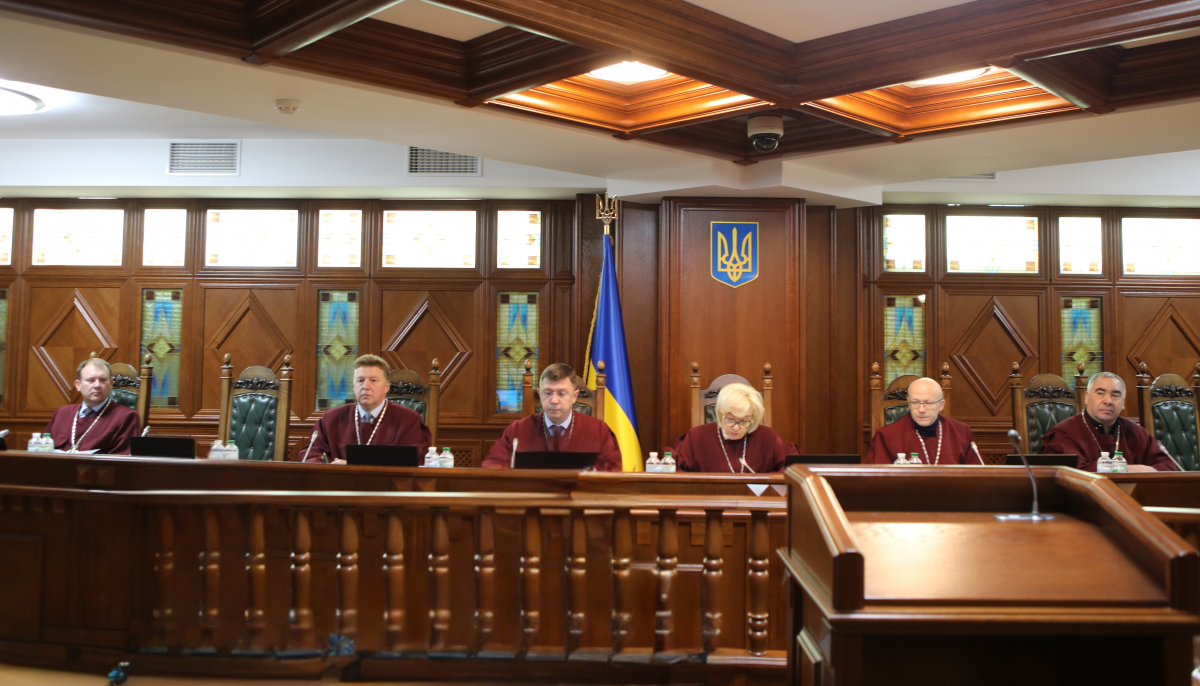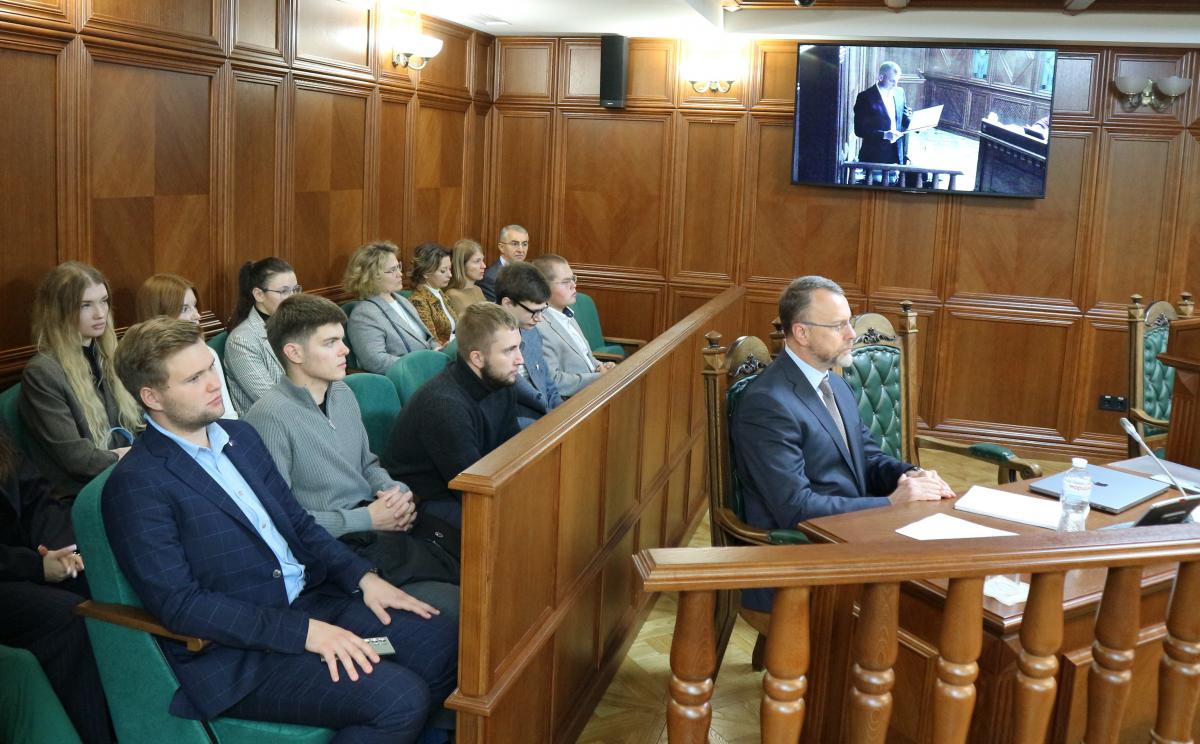3 October, 2025
On 1 October 2025, the Second Senate, in the public part of the plenary session in the form of written proceedings, deliberated the case upon the constitutional complaints lodged by Vitalii Alekseienko and Serhii Ivanushchenko.
During the plenary session, the Judges-Rapporteurs in the case, Oleh Pervomaiskyi and Serhiy Riznyk, informed on the content of the constitutional complaints and the applicants’ arguments, who challenge certain provisions of the Law of Ukraine “On Alternative (Non-Military) Service” dated 12 December 1991 No. 1975-XII (hereinafter, the “Law”), as well as the Criminal Code of Ukraine (hereinafter, the “Code”).
According to Judge-Rapporteur Oleh Pervomaiskyi, the subject of constitutional review in the constitutional complaint of Serhii Ivanushchenko is Article 1.1 of the Law, which stipulates that “alternative service is a service introduced in place of conscription-based military service and aims to fulfill a duty to society,” as well as a provision of Article 4.1 of the Law, which provides that “citizens who are subject to conscription and who personally declare their inability to perform military service as being contrary to their religious beliefs, have confirmed the genuineness of such beliefs by documents or otherwise, and in respect of whom the relevant decisions have been adopted, shall be assigned to alternative service.”
The content of the constitutional complaint and attached to it materials indicate the following.
In February 2024, Serhii Ivanushchenko underwent a military medical commission, which concluded that he was eligible for military service. Referring to his religious beliefs, he submitted to the First Department of the Sumy District Territorial Recruitment and Social Support Center (Bilopillia) (hereinafter, the “First Department of Sumy TRSSC”) an application and a certificate issued by the religious organization “Religious Center of Jehovah’s Witnesses in Ukraine”, confirming that since 25 November 2023, he had been a dedicated baptized minister of the “Religious Association of Jehovah’s Witnesses in Ukraine”. In February 2024, he was given a summons to appear at the First Department of Sumy TRSSC for subsequent referral to a military unit for service during mobilization. He was warned of criminal liability for refusal to perform military service. On the appointed date, Serhii Ivanushchenko failed to appear at the First Department of Sumy TRSSC.
By its judgment of 28 March 2024, the Bilopillia District Court of Sumy Region found him guilty of committing a criminal offense under Article 336 of the Criminal Code of Ukraine (evasion of military service during mobilization) and sentenced him to three years of imprisonment.
The trial court rejected the applicant’s arguments about the impossibility of military service due to religious beliefs, noting that Articles 1 and 4 of the Law only provide possibility for the replacement of conscription-based military service with alternative (non-military) service. Since, under the Law of Ukraine “On Military Duty and Military Service”, conscription-based military service and military service under mobilization during a special period are two separate types of military service, the applicant’s arguments were considered unfounded.
The Sumy Court of Appeal upheld the judgment of the Bilopillia District Court of 28 March 2024. The Supreme Court agreed with the rulings of the trial and appellate courts and left them unchanged.
The applicant believes that the Law as a whole, and in particular the contested provisions, contradict the principle of legal certainty (as an element of the rule of law) and violate his rights to hold religious beliefs incompatible with the performance of military duty, the right to substitute military duty with alternative (non-military) service, as well as the rights to liberty, personal integrity, human dignity, and protection against degrading punishment.
Judge-Rapporteur Oleh Pervomaiskyi also informed that, by its Ruling of 22 July 2025, the Second Senate consolidated the constitutional complaints of Vitalii Alekseienko and Serhii Ivanushchenko into one constitutional proceeding.
During the plenary session, Judge-Rapporteur Serhiy Riznyk presented the content of Vitalii Alekseienko’s constitutional complaint. The applicant challenges Article 1, a provision of Article 2 of the Law, and a provision of Article 336 of the Code.
According to Article 1.2 of the Law, “in conditions of martial law or a state of emergency, certain restrictions on the right of citizens to perform alternative service may be established, specifying the duration of such restrictions.” Article 2 of the Law provides that “the right to alternative service granted to citizens of Ukraine if the performance of military duty contradicts their religious beliefs, and if they belong to religious organizations operating in accordance with Ukrainian law whose doctrine does not allow the use of weapons.”
A provision of Article 336 of the Code establishes criminal liability for “evasion of conscription for military service during mobilization, in a special period.”
As noted by the judge, the applicant claims that the contested provisions of the Law are inconsistent with Articles 24.1, 24.2, 35, 64 of the Constitution of Ukraine, while the contested provision of Article 336 of the Code is inconsistent with Articles 35 and 62.2 of the Constitution of Ukraine.
According to the case materials, the judge-rapporteur noted, during mobilization, conscript Vitalii Alekseienko was found eligible by age and health to perform military service and was twice lawfully summoned to appear at the conscription office for mobilization into the Armed Forces of Ukraine. However, he refused to report to the military unit for service, citing that military service was contrary to his religious beliefs.
By its judgment, upheld on appeal by the Ivano-Frankivsk Court of Appeal, the Ivano-Frankivsk City Court of Ivano-Frankivsk Region found him guilty of committing a criminal offense under Article 336 of the Code and sentenced him to three years of imprisonment. Pursuant to Article 75 of the Code, he was released from serving the sentence with probation for one year and six months, subject to certain obligations.
The Supreme Court dismissed Alekseienko’s cassation appeal and upheld the rulings of the lower courts.
In substantiating the unconstitutionality of Article 1.1 of the Law, the applicant argues, “since the contested provision allows replacement with alternative (non-military) service only for conscription-based military service, which currently does not exist in Ukraine, it entirely prevents the exercise of the constitutional right enshrined in Article 35.4 of the Constitution of Ukraine.”
As to the unconstitutionality of Article 1.2 of the Law, the applicant asserts that “the right of citizens to perform alternative service, as a legal means of ensuring equality before the law under Article 24 of the Constitution, cannot be restricted under martial law or a state of emergency pursuant to Article 64.2 of the Constitution of Ukraine. Therefore, the provision allowing such restrictions is unconstitutional.”
The applicant also argues that the unconstitutionality of the contested provision of Article 336 of the Code lies in the fact that it allows “criminal liability for refusal of conscription into military service of citizens whose religious beliefs are incompatible with the performance of military duty”.
After examining the case materials at the public part of the plenary session, the Second Senate proceeded to the in-camera part of the plenary session.
The plenary session was attended by the authorized representative of the applicant Serhii Ivanushchenko – attorney Vadym Karpov – as well as other citizens of Ukraine.
The public part of the plenary session is available on the Court's official website in the Section “Archive of video broadcasts of sessions”.



